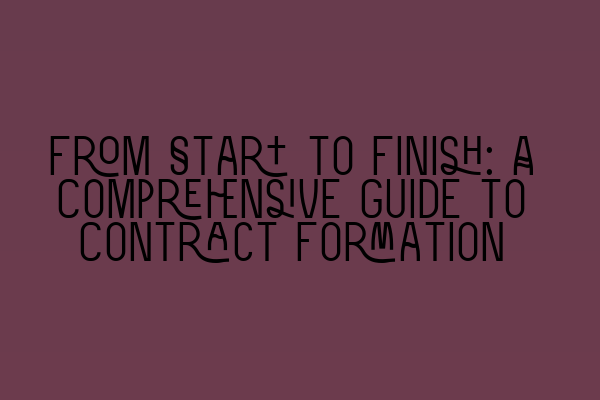From Start to Finish: A Comprehensive Guide to Contract Formation
Contracts are an essential part of any business transaction. They establish the rights and obligations between parties and provide a framework for ensuring that both sides fulfill their promises. Therefore, understanding how contracts are formed is crucial for any aspiring lawyer or business professional. In this comprehensive guide, we will take you through the entire process of contract formation, from the initial stages to its final execution.
1. Preliminary Considerations
Before diving into the complexities of contract formation, it is essential to understand the key terms and concepts associated with it. Some key elements include offer, acceptance, consideration, intention to create legal relations, and capacity to contract. Familiarize yourself with these terms to navigate the contract formation process more effectively.
To test your understanding of these concepts, you can take a look at our SQE 1 Practice Exam Questions that specifically cover contract law topics.
2. Offer and Acceptance
The foundation of any contract lies in the offer and acceptance. An offer represents a clear expression of intent to be bound by specific terms, while acceptance is the unqualified agreement to the terms of the offer. Understanding the requirements for a valid offer and acceptance is crucial to ensure the validity of a contract.
If you want to practice your knowledge of offer and acceptance, you can try our SQE 1 Practice Mocks FLK1 FLK2 that include various scenario-based questions related to contract formation.
3. Consideration and Intention to Create Legal Relations
Consideration refers to something of value that is exchanged between the parties, such as money, goods, or services. It is a vital element in forming a contract. Additionally, the intention to create legal relations is necessary for a contract to be enforceable. Understanding these concepts will help you ensure that all necessary elements are present when drafting or reviewing a contract.
4. Capacity to Contract
Capacity refers to a person’s legal ability to enter into a contract. Not everyone has the capacity to contract, such as minors, mentally impaired individuals, or those under the influence of drugs or alcohol. It is crucial to verify the capacity of the parties involved in a contract to ensure its enforceability.
5. Formalizing the Contract
Once the essential elements of contract formation have been met, it is time to formalize the contract. This usually involves recording the agreement in writing, although some contracts can be formed orally or through conduct. It is important to be aware of the formal requirements for different types of contracts and ensure that they are met to avoid any future disputes.
For information on how to prepare for the SQE exams that cover contract law, you can check out our SQE 2 Preparation Courses and SQE 1 Preparation Courses.
6. Performance and Breach
Once a contract has been formed, the parties are obligated to perform their respective duties as outlined in the agreement. However, there may be instances where one party fails to fulfill its obligations, resulting in a breach of contract. Understanding the consequences of breach and the available remedies is crucial for managing contract disputes effectively.
7. Termination and Conclusion
Contracts may come to an end through various means, such as performance, expiry, or mutual agreement. It is essential to understand the different ways in which a contract can be terminated to avoid any unintended consequences or potential legal disputes. Always ensure that proper termination procedures are followed to protect the interests of all parties involved.
For more information about the SRA SQE exam dates and schedules, you can refer to our article on SRA SQE Exam Dates.
Conclusion
Understanding the process of contract formation is fundamental for anyone involved in business or legal transactions. By familiarizing yourself with the essential elements, requirements, and potential pitfalls of contract formation, you can protect your interests and ensure that contracts are legally binding and enforceable.
If you have any questions or want to further enhance your knowledge, don’t hesitate to explore our comprehensive resources and training materials specifically designed to help you excel in the SQE exams and beyond.
